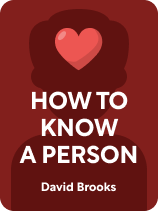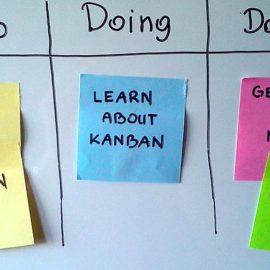

This article is an excerpt from the Shortform book guide to "How to Know a Person" by David Brooks. Shortform has the world's best summaries and analyses of books you should be reading.
Like this article? Sign up for a free trial here.
Do want to know how to improve your social skills? Do you sometimes center the conversation back on yourself?
As we practice learning to know others, we often have to work to counter some of our natural tendencies. These include the tendency to see things in a self-centered way, to be impatient rather than empathetic, or to shy away from the messy parts of others’ lives.
Let’s take a look at how you can work on these tendencies by improving your social skills.
1. Learn to Center Others, Not Yourself
We’re all at the center of our own worlds, and we naturally center ourselves in our thoughts and our conversations. Brooks explains that you’ll know you’ve mastered how to improve your social skills when you step back from your ego and how it wants you to see the world. That’s when you make more room for other people. A great place to start is in the conversations you have every day with others. We all love talking about ourselves, and we sometimes find it challenging to talk about someone else for a change. By learning to resist the tendency to turn the conversation back to yourself—like by telling a friend who’s having trouble with a colleague about your own struggles at work—you can do a better job of being present with them.
Another way Brooks recommends exercising care for others is to pay attention to social situations and to make them more comfortable and equitable for everyone. If there’s a major difference between you and another person—whether in political views or in the amount of power or access you have in a given context—it’s easy for you to make them feel misunderstood or excluded. Brooks advises working to put everyone on even footing so you can exchange ideas respectfully and authentically. For example, you might go into a meeting at work with more seniority than others in the room. But if you take the time to discuss everyone’s opinions, you’ll put your junior colleagues at ease and help them feel their voices are heard.
2. Practice Empathy
Just as we tend to center ourselves, we can also naturally be impatient with people and jump to conclusions about how they’re handling a conversation or a situation. But Brooks explains that by practicing the skill of empathy, you can set yourself up to better understand others. He explains that empathy involves three skills: mirroring, mentalizing, and caring. Mirroring and mentalizing involve understanding the emotions that someone else is feeling in their current circumstances, either by experiencing those emotions yourself or by remembering what you felt in a similar situation. Caring involves centering the other person’s needs—which will often be different from what you would want or need if you were in a similar situation.
| The Different Kinds of Empathy Mentalizing and mirroring correspond with two different kinds of empathy—cognitive and emotional. Cognitive empathy involves understanding others’ emotions without necessarily feeling them yourself (mentalizing), while emotional empathy entails actually experiencing the emotions of others (mirroring). Cognitive empathy, also called “theory of mind,” develops as children grow and enables most people to form ideas about others’ mental states. Some people, including many with autism spectrum disorders, feel emotional empathy more intensely than others. Both kinds of empathy—along with the care Brooks writes we should exercise for others—give us different ways of feeling connected to other people. |
Practicing empathy can help you support people in particularly difficult situations where many of us wouldn’t know what to say or what to do, such as when someone undergoes a loss, a mental health crisis, or another difficult period of their life. Brooks acknowledges it’s hard to know how to support someone in these moments. But you can do so by being present with them in their reality as they see it instead of trying to talk them into seeing things a different way.
(Shortform note: While Brooks emphasizes the importance of practicing empathy in difficult situations, it can be hard to do this in a sustainable way, whether in your friendships or at work. Some organizational psychologists suggest that when they practice empathy, managers should focus on empathic concern rather than emotional empathy. The idea is that by balancing self-care with genuine concern for the other people around you, you can provide effective support for your coworkers—or your friends—without burning yourself out.)
3. See People Clearly in Their Current Stage of Life
Finally, Brooks explains that it’s important to learn to see where people are in their life. To understand how each person is moving through their personal challenges and circumstances, it’s useful to think about where their focus lies. For example, some people are in the process of building an identity and cultivating a unique set of skills. Others are focused on finding important social connections, whether a partner or a close group of friends. Still others are working on building their career or finding a way to make the world a better place.
Brooks explains that learning to recognize these stages can not only help you support others through periods of transition—which are demanding and challenging—but can also help you understand a basic truth about life: that we often have to change and grow to move forward.
(Shortform note: How can you tell where someone’s focus lies? In The Subtle Art of Not Giving a F*ck, Mark Manson proposes a four-stage model of life based on how people progress through different priorities: First, people work on learning norms by observing and imitating others. Second, in young adulthood, they discover their own traits and limitations. Third, as people enter their 30s, they commit to their priorities and relationships. Finally, near retirement age, many people shift their attention to passing on their life’s work and values. Manson writes that people only progress from stage to stage by accepting the inevitability of change—and as Brooks points out, it can be helpful to support others in these times of change and growth.)

———End of Preview———
Like what you just read? Read the rest of the world's best book summary and analysis of David Brooks's "How to Know a Person" at Shortform.
Here's what you'll find in our full How to Know a Person summary:
- The benefits of really getting to know other people
- How to better understand people on a personal level
- Why our morality and relationships are in a crisis






